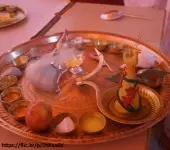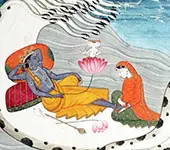Shri Radha's existence transcends the realms of mere imagination and poetry. She is an eternal truth, a spiritual reality that is unchanging and ever-blissful. Unlike worldly forms that evolve or decay, Radha's form is eternal, without beginning or end. Her relationship with Lord Krishna is not confined to the boundaries of earthly relationships; it is a divine connection that surpasses human comprehension. Radha is neither just Krishna's consort nor merely a lover. She embodies the highest form of divine love, which is pure, selfless, and eternal.
- Eternal and Unchanging: Radha’s form is not subject to the changes of time or imagination; it is eternal and blissful.
- Divine Relationship: Radha’s connection with Krishna is profound, transcending worldly definitions of relationships.
- Symbol of Divine Love: Radha embodies the purest form of love, which is selfless and beyond human understanding.
Radha-Krishna: A Divine Union
The relationship between Radha and Krishna is not just a simple partnership. It represents the union of the divine and the eternal. Radha is not a pleasure-seeking woman, as often depicted by some poets, but the epitome of selflessness and devotion. She is the ideal embodiment of divine love, far removed from the worldly concept of romance or passion. Radha's love for Krishna is pure, selfless, and deeply spiritual. She is not merely Krishna's consort but the divine energy that complements and completes him.
- Selfless Devotion: Radha’s love for Krishna is marked by complete selflessness, making her the ultimate devotee.
- Beyond Worldly Desires: Radha’s relationship with Krishna transcends earthly notions of love and passion.
- Complementary Divine Energy: Radha is the divine force that complements Krishna, making their union one of perfect harmony.
The Divine Contemplation of Radha-Madhava
Lord Krishna, the embodiment of Sat-Chit-Ananda, manifests in various divine forms, including Radha and the Gopis. In this divine play, Krishna and Radha are not separate entities but two aspects of the same supreme reality. Radha is the 'Hladini' Shakti, the bliss-giving energy of Krishna, while Krishna is the essence of divine love. Their relationship is one of unity in diversity, where Radha manifests in countless forms to engage in divine pastimes with Krishna. Their union is the ultimate expression of divine love, where the lover and the beloved are one.
- Unity in Diversity: Radha and Krishna, though appearing as two, are eternally one in essence.
- Hladini Shakti: Radha is the bliss-giving energy of Krishna, making their union the epitome of divine love.
- Divine Play: Radha manifests in countless forms to participate in the divine pastimes with Krishna, reflecting their eternal unity.
The Essence of Radha's Love
Radha's love for Krishna is characterized by complete selflessness and humility. She is the supreme devotee who always considers herself unworthy of Krishna's love, despite being the embodiment of all virtues and beauty. Radha's humility is so profound that she constantly feels lacking compared to Krishna, seeing only her flaws and imperfections. This selfless love makes her the perfect devotee and the ideal partner for Krishna. Radha's life revolves entirely around Krishna's happiness, and all her actions are directed towards bringing him joy.
- Selfless Love: Radha’s love is entirely selfless, focused solely on Krishna’s happiness.
- Profound Humility: Despite her divine qualities, Radha always considers herself unworthy, highlighting her deep humility.
- Devotion in Action: Every action of Radha is aimed at bringing joy to Krishna, making her the ideal devotee.
The Divine and the Worldly: A Stark Contrast
The love between Radha and Krishna is of a different nature than worldly love. Worldly love is often driven by desire and self-interest, while Radha's love is pure, selfless, and divine. The difference between the two is as vast as the difference between light and darkness. Radha's love is not motivated by personal gain but by the desire to serve and bring joy to Krishna. This pure love elevates her above all worldly concerns, making her the epitome of divine love. In contrast, worldly love, driven by desire, often leads to downfall and suffering.
- Divine vs. Worldly Love: Radha’s love is pure and selfless, unlike worldly love, which is often driven by desire.
- Light vs. Darkness: The difference between Radha’s divine love and worldly love is as stark as the difference between light and darkness.
- Elevation through Love: Radha’s love elevates her above all worldly concerns, making her the perfect embodiment of divine devotion.
Shri Radha’s glory is beyond human comprehension. She embodies the highest form of divine love, which is pure, selfless, and eternal. Her relationship with Krishna is the ultimate expression of unity in diversity, where the lover and the beloved are one. Radha’s love is not just a symbol of devotion but a divine force that complements and completes Krishna, making their union the epitome of divine love.
Comments
Read more comments
Knowledge Bank
Harnessing the Mind
Just as a skilled charioteer controls powerful horses, your mind guides your senses and actions. Embrace this power by filling your mind with noble thoughts and staying rooted in your inner self. Understand that your desires and tendencies may pull you outward, but your mind's true strength lies within. The Vedas teach us that the mind is vast and all-encompassing, the foundation of wisdom and the creator of endless possibilities. By recognizing the mind's creative potential, you can shape your reality and foster continuous personal growth. Remember, the mind is the source of all actions and desires; by mastering it, you master your life. Stay mindful, grounded, and purposeful, for in doing so, you align with the profound wisdom of the ages, paving the way for a balanced and fulfilling existence.
Niyoga rules
If the husband is impotent or dies childless, the wife can conceive from a brother-in-law. This is called niyoga and is allowed only in the case of childlessness. A woman can do niyoga only for one child or a maximum of two. After the successful union, if the brother-in-law is younger, he treats the woman as his mother. If he is elder, he treats her as his daughter-in-law. Niyoga should be at night. The man has to wear white clothes and apply ghee all over his body for purity. The man and woman have to keep their mind pure and be clear that the act is only for begetting a child. If a prospective bridegroom dies after the engagement, the woman can go for niyoga. (Manu Smriti.9)
Recommended for you
Abhinaya Darpana

Abhinaya Darpana is a treatise on Bharatanatyam written by Nandikeswara. Learn more.....
Click here to know more..Garuda Mantra for Protection from Poisons and Toxic People

तत्पुरुषाय विद्महे सुवर्णपक्षाय धीमहि। तन्नो गरुडः प्र....
Click here to know more..Dashavatara Stava

neelam shareerakara- dhaaritashankhachakram raktaambarandvinayanam surasaumyamaadyam. punyaamri'taarnavavaham paramam pavitram matsyaavataaramamarendr....
Click here to know more..